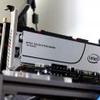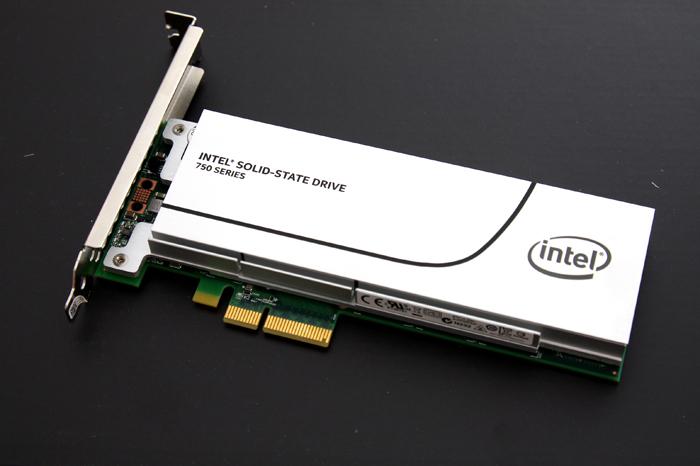Introduction
Intel Series 750 1.2 TB PCIe SSD
Performance at a completely new level...
We review the new Intel 750 NVMe 1.2 TB PCIe SSD. The product is the fastest storage unit we have had in our lab, and I mean ever! In certain scenarios we top 2 to 3 GB/sec speeds whereas 1 GB/sec writes can be considered normal. Priced aggressively Intel seems to have the crown jewels of storage performance in their hands. NVMe - is an abbreviation for that, NVM Express, NVMe, or Non-Volatile Memory Host Controller Interface Specification (NVMHCI) boils down to the specification for accessing solid-state drives (SSDs) attached through the PCI Express (PCIe) bus. "NVM" is an acronym for non-volatile memory, which is used in SSDs. As a logical device interface, SATA3 might not have been long among us, but the performance of NAND based storage is growing much faster compared to the adoption of SATA ports. Your free PCIe lanes as such are a really fast alternative as it is an interface with much more available bandwidth.
Why PCI-Express?
The development rate is going so fast that current component technology cannot keep up with the pace. We had the transition to SATA 3 (6G) and the minute SATA 3 came out these new 6G controllers already started reaching their maximum bandwidth with the latest generation SSDs which can reach 570 MB/sec already. The Intel NVMe PCIe products are, simply put, PCIe SSDs that slips into an empty 4x or higher PCIe slot of your PC motherboard (Gen 3.0 preferred), thus freeing themselves from the SATA3 restrictions. The NAND flash memory is tied to a multi-channel controller. Now shake it, stir it, boil it and boom... a very powerful storage solution will now be throwing silly numbers over the PCI-Express bus, instead of that limiting SATA connector. Though the unit uses a driver, it's bootable as an OS storage unit as well. There are restriction though, but we'll explain that further onwards in our review. The low-profile PCIe 3.0 ready SSD card promises to deliver a good desktop computing experience with fast application loading times, ultra-fast data access and shorter boot-ups of today’s and future high-end desktops featuring PCIe 4x / 16x interface. Available in capacities of 400 GB and 1.2 TB. The product can handle a maximum sustained data read speed is of 2,400 MB/s and the top model write speed is at 1,200 MB/s. Meanwhile, the random 4K performance is hovering at 390,000 IOPS (inputs/outputs per second) on writes. Add to that a life expectancy of 70 GB/day for five years. TRIM and Garbage Collection technologies are all supported as well. All in all we'll have quite a bit to talk about (and show you) today, but have a peek at the product being tested today first.
The Intel Series 750 1.2 TB PCIe SSD is powered by an Intel CH29AE41AB0 controller chip sporting Intel 20 nm 128 Gbit MLC NAND ICs, which we think are rebranded from Micron ICs. For the PCIe model Intel will release two versions, a 400 GB and a 1.2 TB version, the latter one we will test today.


